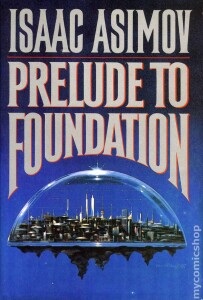
This is the first book in Asimov’s classic Foundation series, though he wrote it after five of the six novels in the series. It is meant to be a guide as well as a prequel. Asimov says he hadn’t planned for his first Foundation short story, published in 1942, to grow into a multi-volume series, so had decided a better introduction was needed.
Hari Seldon, a young mathematician, delivers a paper at a conference held in Trantor, capital of the empire, and thus comes to the attention of young Cleon I, whom we are told is the last Galactic Emperor of his dynasty. Cleon is mostly a figurehead, somewhat like the British royal family, relying completely on Eto Demerzel, his brilliant and somewhat mysterious advisor.
Cleon is intrigued because it sounds as though Seldon has worked out how to predict the future. When they meet, Cleon is disappointed that Seldon’s work is all theoretical and unlikely to yield practical results. However, whether Seldon’s so-called psychohistory actually works is less important to the Emperor than the possibility of using the process to issue rosy predictions about Cleon’s successes, thus calming the restive planets in the far reaches of the empire.
The next day, as he’s preparing to return to his home planet, Seldon meets a journalist in the park. Chetter Hummin alerts Seldon that Demerzel will try to detain him and offers to use his connections to take the mathematician to a safe place. Thus begins what’s known in the Foundation books as The Flight.
I read some of the Foundation novels in my teens, at a time when I was reading a lot of science fiction. I certainly thought they were interesting enough to keep reading the ones that were available then, but now I remember nothing about them, unlike some of the other SF books I consumed back then. A writer friend suggested I read this Prelude.
The story certainly flows well and has plenty of suspense and potentially interesting characters. However, it shows its age. Don’t get me wrong: Asimov was amazing. What an imagination! However, in the following decades—the first Foundation story was published 80 years ago—SF has changed.
An obvious area that’s improved is world-building. Asimov uses two methods of conveying information about the people, culture and settings of the story. One is to preface each chapter with an excerpt from the fictional Encyclopedia Galactica, directly providing information to the reader. The other is that Hari, being new to every world he travels to in the course of The Flight, must have everything explained to him. We have no access to his thoughts, but he obviously doesn’t pick up things on his own; someone must tell him.
As a result, the story is more talk than action, and it’s awkward, stilted talk at that. In today’s SF novels, world-building is much more subtle. It’s incorporated into the story. A particularly effective example is the beginning of The Hunger Games, by Suzanne Collins, which starts with action and the thoughts of the protagonist Katniss. We’re never lectured on the way that world works; instead it becomes clear through what’s going on.
Another area that’s improved in today’s stories is the characters. Hari and the other characters are flat. We don’t learn much about them as people; they are just there to serve the plot. None has the character arc we’ve come to expect in modern novels of every genre, where the person actually changes during the story, as a result of what they experience. Today’s authors get to know their characters as fully rounded people and then set them free to act and react naturally as the story progresses.
This is not a criticism of the Prelude. Plot dominated in most early SF stories. It was a rare author whose characters came alive; Ursula Le Guin comes to mind, though she was writing somewhat later than Asimov.
I’m grateful to be reminded of the enormous strides in quality that SF has made, specifically here with world-building, dialogue, and characterisation, but also thrilled to see again the strong plotting that made these early stories so interesting.
Have you gone back to read a novel from the early days of science fiction?
